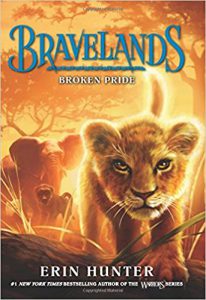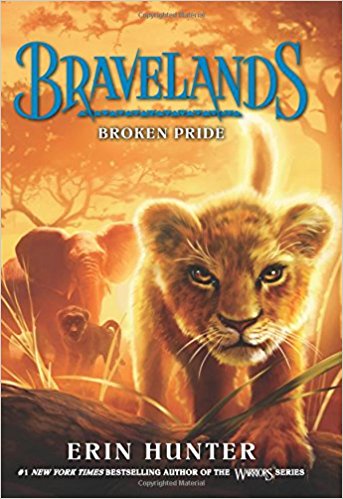 Bravelands: Broken Pride is the first book in a beast fable series by Erin Hunter. The novel offers significant lessons for human society about identity, change, excessive ambition, and the value of believing in a higher power or of adhering to a Code, such as “You may kill only to survive” (18). Although Hunter recycles plot elements from the Disney film Lion King, she reshapes the story with new connections and perspectives, adding threads to develop her themes.
Bravelands: Broken Pride is the first book in a beast fable series by Erin Hunter. The novel offers significant lessons for human society about identity, change, excessive ambition, and the value of believing in a higher power or of adhering to a Code, such as “You may kill only to survive” (18). Although Hunter recycles plot elements from the Disney film Lion King, she reshapes the story with new connections and perspectives, adding threads to develop her themes.
Hunter’s novel follows the adventures of the young lion Fearless, who has been exiled from his pride by the ambitious and evil Titan, who kills Fearless’ father, Gallant, and enslaves his mother, Swift, and his sister, Valor. Like Simba, Fearless vows to defeat Titan and to take back his father’s pride. He also forms alliances with unlikely friends, baboons named Thorn, Mud, and Stinger from Brightforest Troop. After being rescued from an eagle nest by the troop, Fearless becomes the troop’s protector. Until he is exiled by another ruthless and self-important leader, Fearless identifies as a Baboon-Lion, confused by his place and belonging.
The adventures of Fearless and the question of whether he will fulfill his vow are not the only plot threads, however. The novel opens and closes with scenes perceived by Windrider, a vulture with a bird’s eye view of the African savannah who senses an omen in “a tiny cub, with a roar to make the sky shudder” (5) and who reads the wind currents to detect dangerous change.
Another character with the ability to sense foreboding is the young elephant Sky, who receives glimpses of the future from the bones of the dead. She hones these visionary abilities with the help of the herd’s grand matriarch, the Great Mother.
A peace-maker, code-enforcer, and arbiter of disputes, the Great Mother serves as a liaison between the Great Spirit who lives in her and the grass-eaters, flesh-eaters, and rot-eaters that she leads in Bravelands. Readers will likely benefit from the critical thinking exercise that Hunter poses about a leader’s essential qualifications through her characters, Stinger and Grub, baboons who describe a leader quite differently. Readers may also appreciate the opportunity to debate the three feats that enable a baboon to gain ranks in the social hierarchy, with special focus on the contest that occurs in the Glade of Duels.
The Great Mother “summons the Great Gathering every year, and the other tribes of the plains come to her to ask advice, or plead for help, or let her judge disputes” (171). However, “lions don’t recognize or respect the Great Mother” (172) or give credibility to the Great Spirit. In Bravelands, Hunter alludes to the consequences for such audacity.
By this installment’s conclusion, the reader suspects that Hunter will continue to weave threads of action, mystery, and adventure to form an artful tapestry that tells the stories of Fearless, Thorn, and Sky as the series resumes. Nonetheless, the theme of maintaining balance amid difference holds the novel together.
- Posted by Donna

